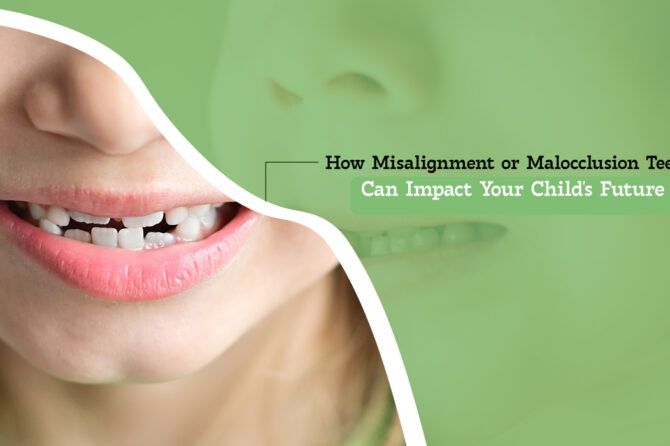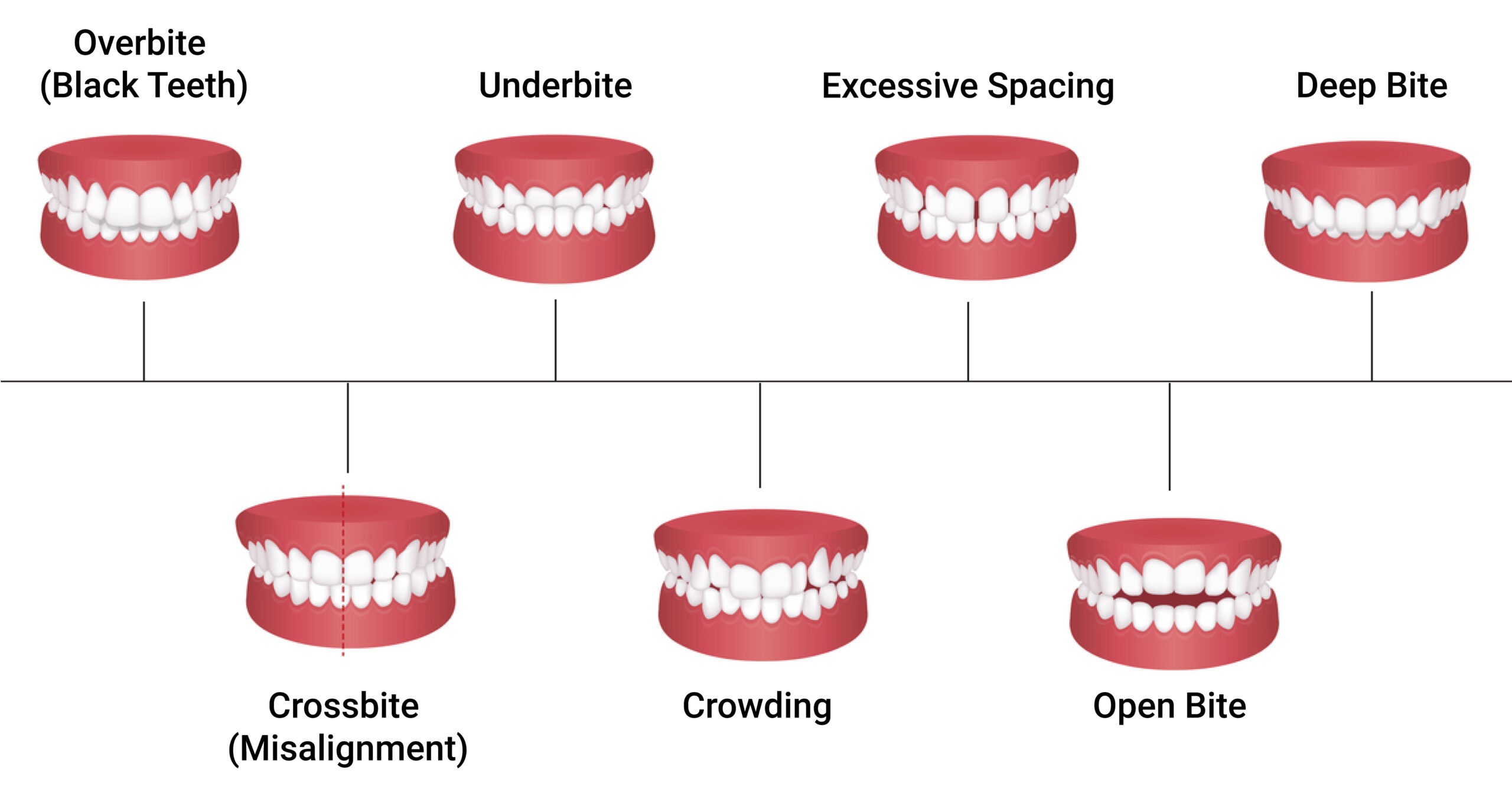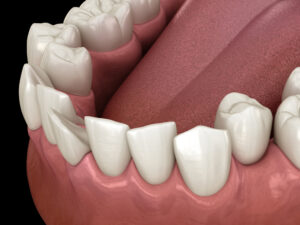
How Misalignment or Malocclusion Teeth Can Impact Your Child’s Future?
Misalignment or malocclusion, commonly known as crooked teeth or a bad bite, can have a significant impact on a child’s life. While many people assume that orthodontic treatment is purely cosmetic, the truth is that misaligned teeth can cause a range of physical and psychological issues. From difficulty in speaking and eating to self-esteem and confidence issues, there are many ways that malocclusion can impact your child’s life. In this blog, we will explore 10 ways that misalignment or malocclusion can affect your child and why it is important to seek treatment early on.
- Difficulty in Eating: Misaligned teeth can make it challenging to bite and chew food properly, leading to digestive issues and poor nutrition.
- Difficulty in Speaking: Malocclusion can affect the position of the tongue and lips, leading to speech impediments such as lisping or difficulty pronouncing certain words.
- Self-Esteem and Confidence Issues: Crooked teeth can cause children to feel self-conscious about their appearance, leading to low self-esteem and confidence issues.
- Dental Problems: Misaligned teeth can make it difficult to clean teeth properly, leading to tooth decay, gum disease, and other dental problems.
- Sleep Apnea: Malocclusion can lead to breathing problems during sleep, causing sleep apnea and other sleep-related disorders.
- Jaw Pain and Headaches: Misaligned teeth can cause an improper bite, leading to jaw pain and headaches.
- Tooth Wear: Misaligned teeth can cause excessive wear on teeth, leading to early tooth decay, gum disease, and other dental problems.
- Injuries: Crooked teeth can be more susceptible to injury during sports or other physical activities.
- Social Life: Misaligned teeth can lead to embarrassment and social isolation, affecting a child’s social life and relationships with others.
- Future Dental Issues: Malocclusion can lead to future dental problems, such as overcrowding, impacted teeth, and other orthodontic issues.
Dental malocclusion
Dental malocclusion, also known as simply malocclusion or a bad bite, refers to an improper alignment of teeth and/or jaws. This condition can occur in children or adults and can be caused by a variety of factors, such as genetics, thumb-sucking, and facial injuries. Malocclusion can lead to a range of issues, including difficulty in biting and chewing, speech problems, dental problems, jaw pain and headaches, and self-esteem and confidence issues. Treatment for malocclusion may involve orthodontic procedures such as braces or clear aligners, and in some cases, surgical intervention may be necessary. It is essential to address malocclusion early on to prevent further dental and health issues.
Malocclusion teeth
 Malocclusion teeth refer to teeth that are misaligned or improperly positioned in the mouth. This condition can occur in both children and adults and can cause a range of issues, including difficulty in biting and chewing, speech problems, dental problems, jaw pain and headaches, and self-esteem and confidence issues. Malocclusion can be caused by various factors such as genetics, thumb-sucking, and facial injuries. Treatment for malocclusion may involve orthodontic procedures such as braces or clear aligners, and in some cases, surgical intervention may be necessary. It is important to address malocclusion early on to prevent further dental and health issues. Regular dental check-ups and consultations with an orthodontist can help identify malocclusion and provide appropriate treatment options.
Malocclusion teeth refer to teeth that are misaligned or improperly positioned in the mouth. This condition can occur in both children and adults and can cause a range of issues, including difficulty in biting and chewing, speech problems, dental problems, jaw pain and headaches, and self-esteem and confidence issues. Malocclusion can be caused by various factors such as genetics, thumb-sucking, and facial injuries. Treatment for malocclusion may involve orthodontic procedures such as braces or clear aligners, and in some cases, surgical intervention may be necessary. It is important to address malocclusion early on to prevent further dental and health issues. Regular dental check-ups and consultations with an orthodontist can help identify malocclusion and provide appropriate treatment options.
Misaligned teeth
 Misaligned teeth refer to teeth that are not properly aligned in the mouth. This can include teeth that are crooked, rotated, overcrowded, or have gaps between them. Misaligned teeth can be caused by various factors such as genetics, thumb-sucking, and facial injuries. This condition can affect a person’s bite, leading to difficulty in biting and chewing, speech problems, dental problems, jaw pain and headaches, and self-esteem and confidence issues. Treatment for misaligned teeth may involve orthodontic procedures such as braces or clear aligners. It is important to address misaligned teeth early on to prevent further dental and health issues. Regular dental check-ups and consultations with Paedodontist can help identify misaligned teeth and provide appropriate treatment options.
Misaligned teeth refer to teeth that are not properly aligned in the mouth. This can include teeth that are crooked, rotated, overcrowded, or have gaps between them. Misaligned teeth can be caused by various factors such as genetics, thumb-sucking, and facial injuries. This condition can affect a person’s bite, leading to difficulty in biting and chewing, speech problems, dental problems, jaw pain and headaches, and self-esteem and confidence issues. Treatment for misaligned teeth may involve orthodontic procedures such as braces or clear aligners. It is important to address misaligned teeth early on to prevent further dental and health issues. Regular dental check-ups and consultations with Paedodontist can help identify misaligned teeth and provide appropriate treatment options.
Conclusion
In conclusion, it is important to understand the impact of misalignment or malocclusion on a child’s life. As we have discussed, it can lead to various physical and psychological issues, affecting a child’s quality of life. Therefore, it is essential to seek orthodontic treatment early on to address these issues and ensure that children can enjoy optimal oral health, improved quality of life, and increased self-confidence. At Kids Dental Studio, our experienced team of pediatric dentists and orthodontists can provide a comprehensive range of dental treatments to address misalignment or malocclusion in children. Contact us to schedule a consultation and learn more about our orthodontic treatment options.
Leave a reply